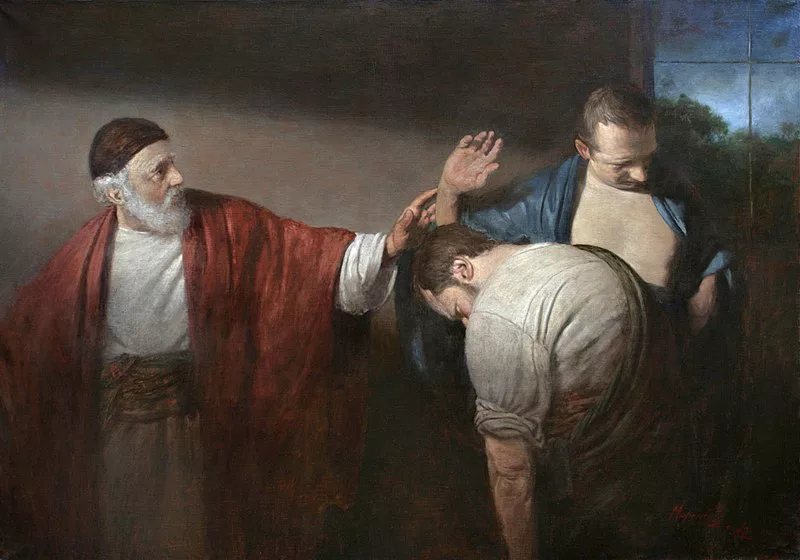
From time to time people ask me to write about the parables of Jesus. This is something I enjoy doing because I love the parables. The parables of Jesus are launch pads to revelation and if we have ears to hear they reveal the wisdom of God. Especially this one:
What do you think? There was a man who had two sons. He went to the first and said, “Son, go and work today in the vineyard.” “I will not,” he answered, but later he changed his mind and went. Then the father went to the other son and said the same thing. He answered, “I will, sir,” but he did not go. (Matt 21:28-30)
Great story! I can’t wait for the movie.
But seriously, it is an awesome story when you understand the context (Jesus was talking to the chief priests and elders) and the question that follows it:
Jesus: “Which of the two did what his father wanted?”
The chief priests and elders: “The first.” (see Matt 21:28-31a)
Okay, so that wasn’t a very hard question. But Jesus is going somewhere with this. Here’s the punchline:
Truly I tell you, the tax collectors and the prostitutes are entering the kingdom of God ahead of you. (Matt 21:31b)
Boomfah!
This little parable is a divine demolition job. It is a barrel of TNT under the edifice of DIY religion.
To the religious leaders Jesus says, “You think you’re tight with God because you’re good and decent, but those you dismiss as sinners – the crooks and the whores – are getting into the kingdom ahead of you.”
What?! [Insert the sound of confused religious types here.]
In a manner of speaking, God asks all of us to work. Who is the one that says yes but doesn’t deliver? It is the religious person who boasts, “I will do everything the Lord has said” (Ex 19:8), but breaks their promise again and again. Think of the Israelites at Sinai promising to keep the law. Think of the Christian at the altar call resolving to try harder. Such a person can never please the Lord because they are relying on their own strength. They are walking in unbelief.
And who is the one that says no but ultimately does the Father’s will? It is the honest sinner who makes no boast about keeping the law but who puts their trust in Jesus. It is the person who says, “God I’ve tried, but I can’t do it. I’m a failure. God help me.”
The way of righteousness
The religious leaders saw themselves as God’s servants but Jesus said they were hypocrites. They were the son who talked a good line but never showed up.
For John came to you to show you the way of righteousness, and you did not believe him, but the tax collectors and the prostitutes did. (Matt 21:32a)
John revealed the way of righteousness by pointing to Jesus who is our righteousness. Religious folk rejected Jesus (Mark 8:31), but sinners came to him in droves and many were radically changed by the power of God. The sick were healed and the dead were raised. Haters became lovers and thieves became givers. Yet despite these signs and wonders, the religious people were not impressed.
And even after you saw this, you did not repent and believe him. (Matt 21:32b)
Even today there are some who think they are doing the work of God by keeping the commands and being moral, but their actions belie a self-confidence that is really unbelief. They work because they do not recognize the finished work of God, and they remain on the outside even as tax collectors and prostitutes enter the kingdom.

The work of God
The religion of self-improvement defines righteousness in terms of keeping the rules. “The commands in the Bible show us how to live for God.” But this is the way of self-righteousness and it leads to failure every time. The true way of righteousness is Jesus who takes our sinful rags and clothes us with his righteousness (Is 61:10).
The religion of self-improvement defines the work of God as rule-keeping and good behavior, but Jesus said the work of God is “to believe in the one he has sent” (John 6:29). This is why the so-called “sinners” have the inside track when it comes to the kingdom of grace. Someone who is honest enough to admit their failings won’t be blinded by any illusions about how good they are.
It is not the healthy who need a doctor, but the sick… For I have not come to call the (self-) righteous, but sinners. (Matt 9:12-13)
If you are confident of your own goodness and decency, hear the parable of the two sons. Your goodness is not good enough. Look into the mirror of the law and you will see that God demands perfection and nothing less.
But if you know that you are imperfect, broken, and sinful, then thank God for Jesus who makes the sinner righteous! Allow the Holy Spirit to persuade you that the righteousness you and I need comes to us as a free gift and is received by faith from first to last. This is the true work of God!
Jesus told two parables about two sons. This one, like the parable of the prodigal, reveals the stunningly good news that God loves us like a father. God does not hold our sins against us, nor does he expect us to perform and work to earn his love. He simply longs for all of us to come home, receive his love, and join the party.
Grace and peace to you!
